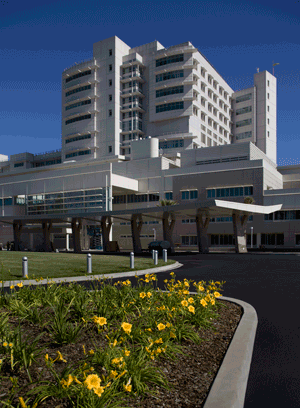
UC Davis Medical Center has received the highest level of recognition possible for stroke care from the American Heart Association/American Stroke Association's Get With the Guidelines program.
The UC Davis Stroke Program has received a 2011 Get With The Guidelines-Stroke Gold Plus Quality Achievement Award from the American Heart Association/American Stroke Association for its commitment to and success in implementing excellent care for stroke patients.
The award program considers quality measures related to the use of specific medications and the availability of screening, education and rehabilitation services. "Gold Plus" is the highest level of recognition possible and signifies consistent adherence to those quality measures over the course of at least 24 consecutive months.
The overall goal is to recognize programs that have taken specific steps to reduce death and disability from stroke and improve the lives of patients.
"The UC Davis Stroke Program team is focused on providing the absolute best care to patients," said Patricia Zrelak, nurse manager of the program. "Recognition of our efforts from a nationally regarded stroke awareness and prevention organization is confirmation of our commitment to offering the latest protocols and complying with evidence-based standards of care."
UC Davis Medical Center's comprehensive system for the rapid diagnosis and treatment of stroke patients admitted to the hospital from the emergency department aims to save lives and prevent cellular injury from the lack of oxygen to brain tissues.
The response includes the latest equipment for brain imaging, neurologists to manage stroke patients during the acute and subacute period, interventional neuroradiologists to administer catheter-based treatments, a dedicated stroke unit and a neurological surgery intensive care unit.
A stroke occurs when a blood vessel that carries oxygen and nutrients to the brain is either blocked by a clot (causing an ischemic stroke) or bursts (causing a hemorrhagic stroke). When that happens, part of the brain starts to die.
A third type of stroke — transient ischemic attack, or TIA — is caused by a temporary blood clot and often called a "warning" stroke.
Each year, 795,000 Americans suffer a stroke, which is one of the leading causes of serious, long-term disability in the United States.
"Our team of specialists... are all united to ensure our patients get the treatment and services they need to regain their health and functions. This award is the latest recognition that we are doing all we can to achieve that goal."
— Piero Verro, UC Davis Stroke Program
"A stroke can change lives forever," said Piero Verro, professor of neurology and director of the UC Davis Stroke Program. "Our team of specialists in emergency medicine, neurology, speech and physical therapy, radiology, neurosurgery, vascular surgery, nursing and occupational therapy are all united to ensure our patients get the treatment and services they need to regain their health and functions.
"This award is the latest recognition that we are doing all we can to achieve that goal."
About Get With The Guidelines:
Get With the Guidelines is the American Heart Association/American Stroke Association's hospital-based quality improvement program that empowers health-care teams to save lives and reduce health-care costs by following evidence-based guidelines and recommendations. For more information, visit heart.org/quality.
About UC Davis Medical Center:
UC Davis Medical Center is a comprehensive academic medical center where clinical practice, teaching and research converge to advance human health. Centers of excellence include the National Cancer Institute-designated UC Davis Cancer Center; the region's only level I pediatric and adult trauma centers; the UC Davis MIND Institute, devoted to finding treatments and cures for neurodevelopmental disorders; and the UC Davis Children's Hospital.
The medical center serves a 33-county, 65,000-square-mile area that stretches north to the Oregon border and east to Nevada. It further extends its reach through the award-winning telemedicine program, which gives remote, medically underserved communities throughout California unprecedented access to specialty and subspecialty care.